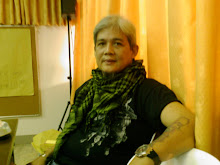-1-
On a Philosophy Teaching Program
On a Philosophy Teaching Program
1.1 In academe, a Philosophy teaching program should be developed based on the Marxist-Gramscian transformativist paradigm where the stress is on getting to critical philosophizing that responds to the Marxist challenge that Philosophy should not only interpret the world in various ways but to change it.
1.2 In this light, the aim is to locate Philosophy in the context of a Praxis as well as to bring critical philosophizing to the level of the masses, thereby empowering them and in the process, blurring the chasm between the professional and the lay. Though not a Marxist, Rorty had the same project: the de-professionalization of traditionally academic disciplines.
-2-
On the Challenge of Filipino Theologizing
2.1 Can we not find a way to draw inspiration in theologizing from our experience of spirituality as Filipinos sans elements of Christianity? Perhaps the better question is, Isn't it really feasible to talk of Filipino spirituality outside of the trappings of Christian presuppositions and influences? Well, of course, I'd like to believe that Christianity genuinely deeply inspires lives—no question about that. But isn't it more worth considering if it is still possible to hear—even in its faintest manifestations—the resonance of pre-colonial spirituality? I feel more challenged by an exploratory study to seek a way to get to the distant past where hopefully we could find and be inspired by a deeper spirituality of our ancient ancestors. I am challenged by the possibility of a more meaningful type of spirituality that is free from the colonial and therefore alienating hegemony of Judaeo-Christian theological formulations.
2.2 The feasibility of connecting to the ancient roots in reflection of certain so-called fundamental ideas of faith should be sought. And in this consideration, I’d rather think of faith not strictly in Christian terms for doing so would be alienating to the faithful of other spiritual persuasions.
2.3 One project that very much responds to this is the one done by the actress and environmental activist Chin-chin Gutierrez which culminated in the production of a collection of ancient lullabies or cradle music from different Philippine ethno-linguistic traditions. This is a “three-year project [considered as] the first known compilation of documented ‘cradle music’ interpreted by a pop artist from personal research, interviews and recordings with various tribal and linguistic groups in the Philippines.” (http://www.oovrag.com/books/2004uyayi.shtml)
2.4 Perhaps, a more expanded view of spirituality free from the confines of the meta-narratives laid down by established religions of Western orientations is of notable significance at this point of our reflection. Chin-chin’s spiritual reflections and project bring to our 21st century sensibility and sensitivity the morphological resonance of a deep spirituality that captures in artistic expressions the richness of a past that is not-yet-dead and to which we can authentically and significantly connect. I’d like to believe that a further consideration of this special concern may be profoundly enriched by a careful review of what C. G. Jung wants to say in the elaboration of his depth-psychology theorizing.
-3-
On the Challenges of "Not Getting Any Younger"
3.1 It is not only from a reflection of our own individual lives that we shape new aspirations and ways of making things happen. Philosophically—and existentially, for that matter—we see in lives of the young the vast expanse of a limitless reality as conjured by an inherent sense of the future in every possibilizing human person. Though, of course, theirs is still wider—probably, more challenging is the proper term—than ours who are already heading towards the twilight of our being. But who will tell us to stop and give up creating the future that we have always dreamt of, not only for ourselves but for the future generations?
3.2 In the Prologue of Nikos Kazantzakis’ Spiritual Exercises, it is said “We come from a dark abyss, we end in a dark abyss and we call the luminous interval life. As soon as we are born, the return begins. At once, the setting forth and the coming back; we die in every moment. Because of this, many have cried out, ‘The goal of life is death!’ But as soon as we are born, we begin the struggle to create, to compose, to turn matter into life. We are born in every moment. Because of this many have cried out, ‘The goal of ephemeral life is immortality!’”
3.3 The creative impulse—the élan vital of Bergson’s theorizing—continues to flutter. Nietzsche’s Will to Power persists to make its way to new challenges. At the end of the road—as well as of the day—I hope to shake hands with Teilhard de Chardin when we get to Point Omega.
3.3 The creative impulse—the élan vital of Bergson’s theorizing—continues to flutter. Nietzsche’s Will to Power persists to make its way to new challenges. At the end of the road—as well as of the day—I hope to shake hands with Teilhard de Chardin when we get to Point Omega.

No comments:
Post a Comment